英语特殊疑问句的构成
小学英语五年级特殊疑问句
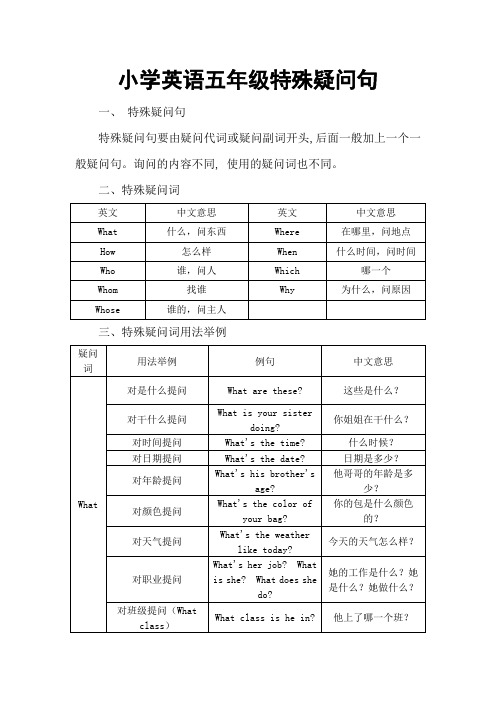
小学英语五年级特殊疑问句一、特殊疑问句特殊疑问句要由疑问代词或疑问副词开头,后面一般加上一个一般疑问句。
询问的内容不同, 使用的疑问词也不同。
二、特殊疑问词三、特殊疑问词用法举例四、疑问词填空练习【牛刀小试】1.( ) do you like?2.( ) many birds do you see?3.( ) is that man?4.( )can you do ?5.—( ) your name?—My name’s Amy.6.—( ) this/that?—It’s a bear!7.—( ) do you like?—I like watermelons.8.—( ) in the classroom?—One blackboard, one TV, many desks and...—It’s blue and white.10.—( )would you like for dinner?—I’d like some beef and noodles.11.—( )your father’s job?—My father is a doctor.12.—( )time is it?—It’s 9 o’clock.13.—( ) the weather like in London?—It's rainy.14.—( ) are these/those?—They are tomatoes.15.—( )are you?—I’m fine. Thank you./ Very well. Thanks. 16.—( )old are you?—I’m twelve years old.17.—( ) many kites do you see/have?—I see/have ten kites.18.—( ) many people are there in your family? —Nine.19.—( ) much is it?—It’s 89 dollars.—I’m from the USA. 21.—( ) is my car?—It’s under the chair. 22.—( )is it?—It’s near the window.’23.—( ) is the library? —It’s on the second floor.24.—( )is that boy?—He is my brother. 25.—( )is he?—He is Zhang Peng. 26.—( )coat is it?—It's your father’s. 27.—( )are these? —They are mine.28.( )is the crayon?—It's in the pencil box. 29.( ) is that girl? ---She is my sister .。
英语 特殊疑问句 成分划分
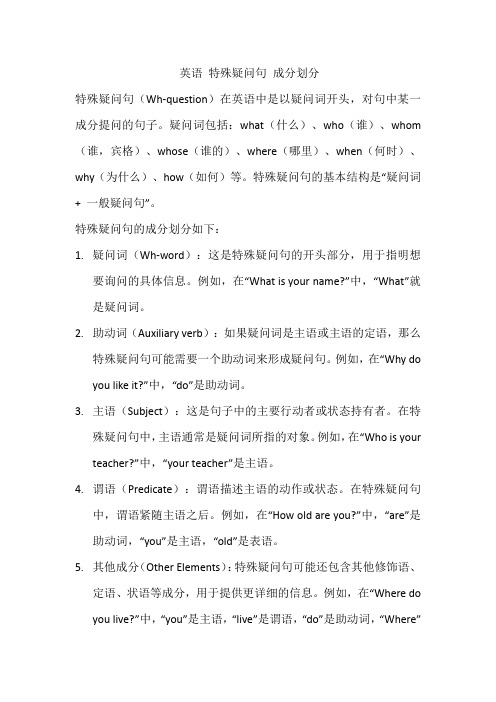
英语特殊疑问句成分划分特殊疑问句(Wh-question)在英语中是以疑问词开头,对句中某一成分提问的句子。
疑问词包括:what(什么)、who(谁)、whom (谁,宾格)、whose(谁的)、where(哪里)、when(何时)、why(为什么)、how(如何)等。
特殊疑问句的基本结构是“疑问词+ 一般疑问句”。
特殊疑问句的成分划分如下:1.疑问词(Wh-word):这是特殊疑问句的开头部分,用于指明想要询问的具体信息。
例如,在“What is your name?”中,“What”就是疑问词。
2.助动词(Auxiliary verb):如果疑问词是主语或主语的定语,那么特殊疑问句可能需要一个助动词来形成疑问句。
例如,在“Why do you like it?”中,“do”是助动词。
3.主语(Subject):这是句子中的主要行动者或状态持有者。
在特殊疑问句中,主语通常是疑问词所指的对象。
例如,在“Who is your teacher?”中,“your teacher”是主语。
4.谓语(Predicate):谓语描述主语的动作或状态。
在特殊疑问句中,谓语紧随主语之后。
例如,在“How old are you?”中,“are”是助动词,“you”是主语,“old”是表语。
5.其他成分(Other Elements):特殊疑问句可能还包含其他修饰语、定语、状语等成分,用于提供更详细的信息。
例如,在“Where do you live?”中,“you”是主语,“live”是谓语,“do”是助动词,“Where”是疑问词,“do you live”是整个句子的宾语部分。
英语特殊疑问句的结构
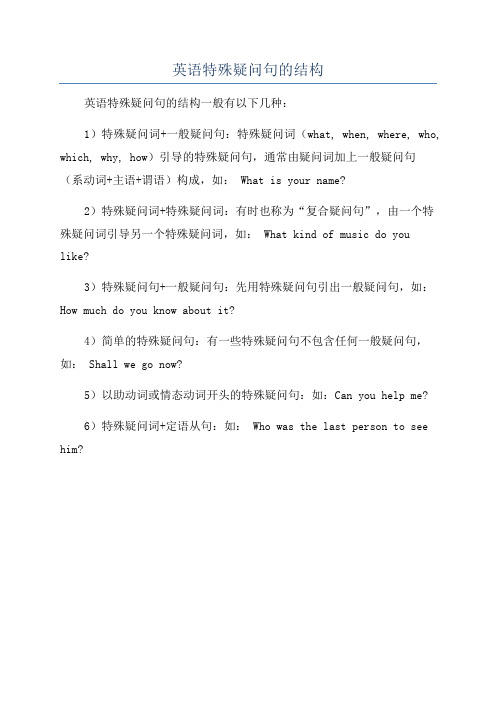
英语特殊疑问句的结构
英语特殊疑问句的结构一般有以下几种:
1)特殊疑问词+一般疑问句:特殊疑问词(what, when, where, who, which, why, how)引导的特殊疑问句,通常由疑问词加上一般疑问句
(系动词+主语+谓语)构成,如: What is your name?
2)特殊疑问词+特殊疑问词:有时也称为“复合疑问句”,由一个特
殊疑问词引导另一个特殊疑问词,如: What kind of music do you like?
3)特殊疑问句+一般疑问句:先用特殊疑问句引出一般疑问句,如:How much do you know about it?
4)简单的特殊疑问句:有一些特殊疑问句不包含任何一般疑问句,如: Shall we go now?
5)以助动词或情态动词开头的特殊疑问句:如:Can you help me?
6)特殊疑问词+定语从句:如: Who was the last person to see him?。
特殊疑问句

特殊疑问句(对划线部分提问)特殊疑问句【一】一、以特殊疑问词开头,对句中某一成分提问的句子叫特殊疑问句。
常用的疑问词有:what 、who 、whose 、which 、when 、where 、how 、why等。
可先分为3种: 疑问代词:what,who,which,whose,whom 疑问副词:when,where,why,how 疑问形容词:what(which,whose)+名词二、特殊疑问句有两种语序1.如疑问词作主语或主语的定语,即对主语或主语的定语提问,其语序是陈述句的语序:疑问词(+主语)+谓语动词+其他成分。
如:Who is singing in the room﹖whose bike is broken ﹖2.如疑问词作其他成分,即对其他成分提问,其语序是:疑问词+一般疑问句语序?如:What class are you in﹖What does she look like﹖Where are you from﹖What time does he get up every morning﹖How do you know﹖三、注意1.回答特殊疑问句时,不能用yes / no,即问什么答什么,尤其是简略回答。
如:Who is from Canada﹖Helen(is).Where's the restaurant﹖Near the station.Why do you like koalas﹖Because they are cute.2.特殊疑问句一般读降调(↓)。
特殊疑问词Who谁 Whose谁的 Why为什么 When什么时候 Where在哪里 Which 哪一个 What什么 What time什么时间 What color什么颜色How怎么样 How many多少{数量}How much多少钱{价格},多少(对不可数名词进行提问)How long多长How often多少次How big多大 How heavy多重{重量}How far多远{路程}特殊疑问句【二】1. 定义以特殊疑问词开头,对陈述句中的某一部分提出疑问 / 进行发问的句子叫特殊疑问句。
特殊疑问句的两种句式结构
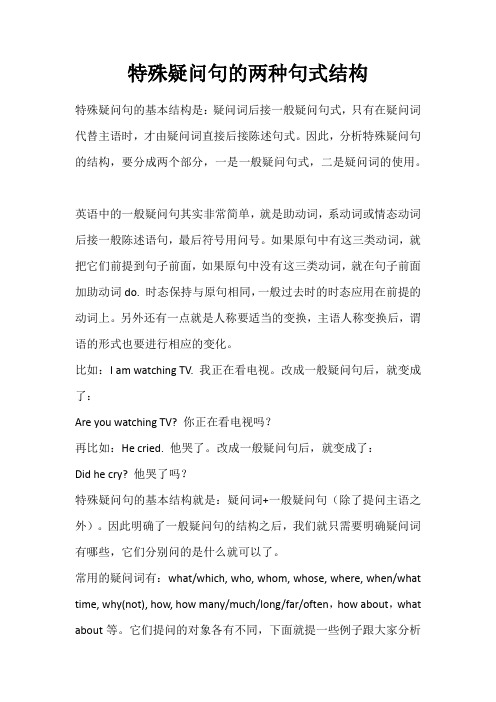
特殊疑问句的两种句式结构特殊疑问句的基本结构是:疑问词后接一般疑问句式,只有在疑问词代替主语时,才由疑问词直接后接陈述句式。
因此,分析特殊疑问句的结构,要分成两个部分,一是一般疑问句式,二是疑问词的使用。
英语中的一般疑问句其实非常简单,就是助动词,系动词或情态动词后接一般陈述语句,最后符号用问号。
如果原句中有这三类动词,就把它们前提到句子前面,如果原句中没有这三类动词,就在句子前面加助动词do. 时态保持与原句相同,一般过去时的时态应用在前提的动词上。
另外还有一点就是人称要适当的变换,主语人称变换后,谓语的形式也要进行相应的变化。
比如:I am watching TV. 我正在看电视。
改成一般疑问句后,就变成了:Are you watching TV? 你正在看电视吗?再比如:He cried. 他哭了。
改成一般疑问句后,就变成了:Did he cry? 他哭了吗?特殊疑问句的基本结构就是:疑问词+一般疑问句(除了提问主语之外)。
因此明确了一般疑问句的结构之后,我们就只需要明确疑问词有哪些,它们分别问的是什么就可以了。
常用的疑问词有:what/which, who, whom, whose, where, when/what time, why(not), how, how many/much/long/far/often,how about,what about等。
它们提问的对象各有不同,下面就提一些例子跟大家分析一下。
比如原句是:I gave him your books here yesterday. 我昨天在这里把你的书给了他。
如果问的是“I”的话,那么就说:Who gave him my books here yesterday?(这是唯一不用一般疑问句式,而采用疑问词直接带陈述语序的)谁昨天在这里把我的书送给了他?如果问的是“him”的话,那么就说:Whom did you gave my books here yesterday? 你昨天在这里把我的书送给了谁?如果问的是“my”的话,那么就说:Whose books did you gave him here yesterday? (这里要把book前提到whose后面)你昨天在这里把谁的书送给了他?如果问的是“my books”的话,那么就说:What did you gave him here yesterday? 你昨天在这里把什么送给了他?如果问的是“here”的话,那么就说:Where did you gave him my books here yesterday? 你昨天在哪里把我的书送给了他?如果问的是“yesterday”的话,那么就说:When did you gave him my books here yesterday? 你什么时候在这里把我的书送给了他?如果要问原因,就说:Why did you gave him my books here yesterday? 你昨天在这里为什么把我的书送给了他其余的疑问词用法无法一一尽述,其用法大概相似,请自行举例练习,可以在文章下面留言,一直探究,交流看法。
英语特殊疑问句结构
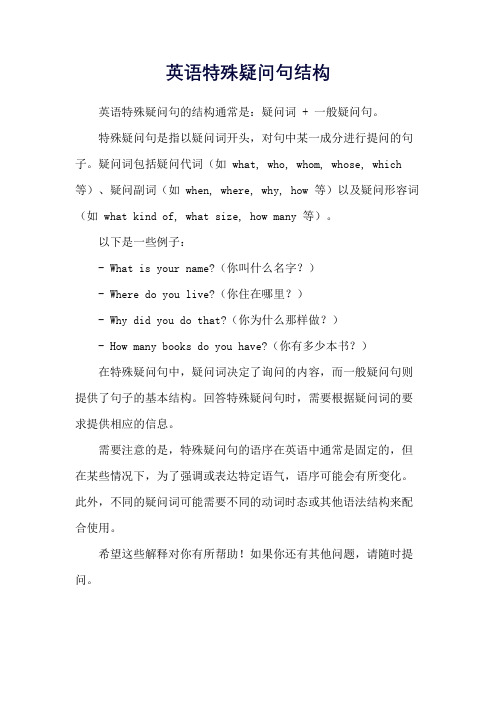
英语特殊疑问句结构
英语特殊疑问句的结构通常是:疑问词 + 一般疑问句。
特殊疑问句是指以疑问词开头,对句中某一成分进行提问的句子。
疑问词包括疑问代词(如 what, who, whom, whose, which 等)、疑问副词(如 when, where, why, how 等)以及疑问形容词(如 what kind of, what size, how many 等)。
以下是一些例子:
- What is your name?(你叫什么名字?)
- Where do you live?(你住在哪里?)
- Why did you do that?(你为什么那样做?)
- How many books do you have?(你有多少本书?)
在特殊疑问句中,疑问词决定了询问的内容,而一般疑问句则提供了句子的基本结构。
回答特殊疑问句时,需要根据疑问词的要求提供相应的信息。
需要注意的是,特殊疑问句的语序在英语中通常是固定的,但在某些情况下,为了强调或表达特定语气,语序可能会有所变化。
此外,不同的疑问词可能需要不同的动词时态或其他语法结构来配合使用。
希望这些解释对你有所帮助!如果你还有其他问题,请随时提问。
英语的特殊疑问句

英语的特殊疑问句
【原创实用版】
目录
1.英语特殊疑问句的定义和作用
2.英语特殊疑问句的分类
3.英语特殊疑问句的构成
4.英语特殊疑问句的用法示例
5.英语特殊疑问句与其他疑问句的区别
正文
英语特殊疑问句是一种用于询问特定信息的疑问句。
在英语中,特殊疑问句与一般疑问句不同,一般疑问句是用来询问某个句子是否为真,而特殊疑问句则是用来询问具体的信息。
例如,“你叫什么名字?”这是一句特殊疑问句,它的目的是询问对方的名字。
英语特殊疑问句可以分为很多种,常见的有:疑问词 + 一般疑问句、疑问词 + 陈述句、疑问词 + 动词 + 宾语等。
其中,疑问词是特殊疑问句的关键部分,常用的疑问词有:what、where、when、why、how 等。
英语特殊疑问句的构成一般是由疑问词引导,后面跟一般疑问句或者陈述句。
例如,“你昨天晚上吃了什么?”这是一句由疑问词“什么”引导的特殊疑问句,它的构成是“疑问词 + 一般疑问句”。
英语特殊疑问句的用法示例如下:
1.疑问词 + 一般疑问句:What did you do yesterday?(你昨天做了什么?)
2.疑问词 + 陈述句:This is the book you borrowed, isn"t it?(这是你借的书,对吗?)
3.疑问词 + 动词 + 宾语:I don"t know where he lives.(我不知道他住在哪里。
)
英语特殊疑问句与其他疑问句的区别主要在于它的目的是询问特定信息,而不是询问句子的真假。
此外,特殊疑问句需要使用疑问词来引导,而其他疑问句则不需要。
英语语法之特殊疑问句

1 / 3特殊疑问句1、概念:以疑问词开头,对句中某一成分提问的句子叫特殊疑问句。
2、疑问词:疑问代词:what(作主、宾、表语), who(主,表), whose(定、表), whom(宾语), which(主、宾、定、表)疑问代词都属于第三人称,一般为单数,有时也是复数。
What, whose, which作定语时,必须放在它们能修饰的名词前。
疑问副词:when, where, how, how old, how many,how much, how long, how far, why.疑问副词做状语。
3、构成:(1)对主语或主语的定语提问时,疑问词+陈述句。
如:What’s your name ?Who’s he?Whose pen is on the desk?Which desk is his?(2)对其他部分提问时,疑问词+一般疑问句。
1 / 32 / 3What are you doing?Where are you from?How old are you?How many pens do you have?4、特殊疑问句为降调。
5、回答:问什么答什么。
6、举例①My name is Li Lei.What is your name ?②He is Wang Ming.Who is he?③This is Li Lei’s pen.Whose pen is this?④My pen is red.What co lour is your pen?⑤I’m six years old.How old are you?⑥ I have two story books.How many story books do you have?⑦I’m from China.Where are you from?⑧The cat is on my desk.2 / 33 / 3Where is the cat?⑨We read English book every morning.When do you read English book?3 / 3。
- 1、下载文档前请自行甄别文档内容的完整性,平台不提供额外的编辑、内容补充、找答案等附加服务。
- 2、"仅部分预览"的文档,不可在线预览部分如存在完整性等问题,可反馈申请退款(可完整预览的文档不适用该条件!)。
- 3、如文档侵犯您的权益,请联系客服反馈,我们会尽快为您处理(人工客服工作时间:9:00-18:30)。
英语特殊疑问句的构成
曹虹
在英语中,以特殊疑问词开头的问句叫做特殊疑问句。
常用的特殊疑问词有what, who, whom, which, whose, when, where, how, why。
其构成方式如下:
一、如提问主语或主语的修饰词,被提问的部分变成疑问词放在句首,其余部
分语序不变。
其结构为:疑问词(+主语)+陈述句?。
如:
1My sister plays the piano well.
Who plays the piano well?
2Only six students could answer this question.
How many students could answer this question?
3The girl sitting next to me is good at painting.
Which girl is good at painting?
二、如提问的部分是除主语和谓语之外的其他部分,则将其变成疑问词,放在
句首,其余部分按一般疑问句的语序。
其结构为:疑问词+一般疑问句?。
如:
1Yesterday the children played games quietly in their room.
When did the children play games quietly in their room?地区(提问yesterday)What did the children play quietly in their room yesterday?(提问games)
How did the children play games in their room yesterday?( 提问quietly)
Where did the children play games quietly yesterday?( 提问in their room)
三、如提问的是修饰词部分,则将其变成疑问词,放在句首,同时将被修饰的
部分提前放在疑问词之后。
其结构为:疑问词+被修饰词+一般疑问句?。
如:
1There are four people in my family.
How many people are there in your family?
2Last week the scientist gave us a talk on modern science.
What talk did the scientist give you last week?
四、如提问的部分包括谓语动词在内,则疑问词用what,放在句首,被提问的
动词用do代替,其余部分按一般疑问句的语序。
其结构为:疑问词(what)+一般疑问句?。
(注意:问句中的时态必须和原句保持一致。
)如:
1He was playing computer games this time yesterday.
What was he doing this time yesterday?
2They have cleaned the classroom.
What have they done?
3We’re going to have a sports meet next week.
What are you going to do next week?
练习:对下列句中的划线部分提问。
1The first class begins at eight o’clock.
2I go to work by bike.
3They often had meetings in his room
4The jacket costs six yuan.
5His flat is on the third floor.
6They go to the movies twice a week.
7My teacher can speak four foreign languages.
8He comes to my house every evening to help me with my English.
9It takes you three hours to go to Hong Kong by air.
10This wallet belongs to him.
11I reviewed my lessons yesterday.
12Wei Fang is doing her lessons.
13She has just got a letter from her brother in the U.S.
14He will be thirteen next year.
15Tom was absent because of the rain.
16Li Pin’s handwriting is the best in his class.
17I have been in Beijing for about 20 years.
18There is a little water in the glass.
19I am going to tell you a story.
20The Changjiang River is the longest river in China.
练习:按提示回答下列问题
1What do they play every day? (tennis)
2Where were you last night? (at the cinema)
3Why was she late for school? (because she got up late)
4What were you doing this time yesterday evening? (watch TV) 5When did you turn on the TV? (after supper)
6How many days are there in a week? (seven)
7How long has she lived in the house? (since 1970)
8Who is going to answer the question? (David)
9Why did she get up so early? (to catch the first bus)
10Whose dictionary have you borrowed? (Tom’s)。
